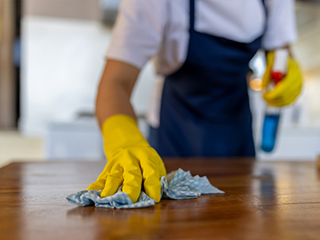Spring-clean Your Way to Better Health

By: ARLENE CABRERA, FNP-C
Spring-cleaning is a good way to greet the arrival of warm weather after being cooped up indoors for months. It’s a time to declutter and purge, but it also has real health benefits, from boosting your immune system to reducing stress. Before you pick up a broom, see how making your house cleaner can also make you healthier.
Spring-cleaning can prevent illness
Items in the house you use a lot, especially if several people use them, can be breeding grounds for viruses and bacteria. Things like faucets, doorknobs, cutting boards and counters need to be thoroughly cleaned to prevent the spread of germs.
Tips to prevent illness:
- Clean the items you use most, or items that could come in contact with your mouth, eyes or nose, including your cellphone, keyboard, bedding and towels.
- Sanitize surfaces with alcohol-based cleaners to kill germs.
- Certain parts of the kitchen need special attention, such as the refrigerator and freezer, pantry, counters and cupboards. The kitchen sink can contain more bacteria than a toilet — Yuck! — so clean it regularly.
- Wash all your produce before cooking to prevent foodborne illness.
- Pay special attention to bathrooms and other places that are shared with family members.
Spring-cleaning can decrease stress and improve mood
We spend most of the winter months inside, and many of us are working at home at least part time due to COVID-19. Stuff tends to accumulate, and clutter can negatively impact our mood and sense of well-being.
Many people find that the process of sorting through items, reorganizing and getting rid of unwanted stuff by tossing, donating or recycling them can be mentally refreshing. Studies have found that people who clean out clutter enjoy better moods and report being able to think and sleep better.
Tips to improve mental health:
- Don’t just stack magazines or shove unworn clothes into the closet. Sort through clothing, toiletries, kitchen supplies and paperwork. Get rid of things you no longer need.
- To help you sleep better, keep only essentials on your bedside table. Also, one study reported that people who change their sheets often sleep better than those who don’t.
- Use cleaning as a de-stressing ritual. As you clean, practice being mindful of the tasks you’re doing. This will help promote a positive attitude and clear mind.
Spring-cleaning protects your immune system
During the winter months, allergens like dust, mold, mildew and pet dander collect in your house. Plus, the blossoming of plants outdoors can bring seasonal allergens into your home, increasing your risk for allergies and other respiratory problems. A clean house can help you breathe better by preventing respiratory issues and supporting a healthy immune system.
Tips to boost your immune health:
- Dust all surfaces, including those you may not usually clean, including the legs of furniture, tops of frames and mirrors, tops of lamps and lights, floor baseboards, railings and window sills.
- Vacuum your floors – especially the corners — curtains and ceiling cobwebs to eliminate dust. Wash rugs, when possible, and consider having your carpets cleaned to remove deep-down dirt.
- Wash all bedding and blankets. Put pillows into the dryer on high heat for 10 minutes to kill any dust mites.
- Change your furnace filters to make sure the air in your house stays cleaner.
- Take off your shoes at the door to avoid carrying in dirt and dust.
Spring-cleaning reduces risk of injury
Falls at home are a common cause of injuries, especially among older adults. Spring is a good time to make adjustments to your home, or an older parent’s home, to reduce the risk of falls. Having a clear path and removing obstacles can help reduce the risk of accidents.
Tips for a safer home:
- Remove clutter from pathways, hallways and staircases. This includes backpacks, shoes, sports equipment, shopping bags and boxes.
- Fasten down loose rugs with double-faced tape, tacks or a slip-resistant backing.
- Tack electrical cords to baseboards or reroute them along the wall to eliminate the risk of tripping on one.
- Move coffee tables, magazine racks and plant stands from high-traffic areas.
- Use nonslip mats in your bathtub or shower.
 Arlene Cabrera, FNP-C, received her Bachelor of Science in Nursing degree from Far Eastern University, Philippines, and her Master of Science in Nursing degree from Walden University, Minneapolis, Minn. Formerly an intensive care nurse with the University of Maryland Medical System, she treats patients in MPCP’s Arundel Mills office.
Arlene Cabrera, FNP-C, received her Bachelor of Science in Nursing degree from Far Eastern University, Philippines, and her Master of Science in Nursing degree from Walden University, Minneapolis, Minn. Formerly an intensive care nurse with the University of Maryland Medical System, she treats patients in MPCP’s Arundel Mills office.



